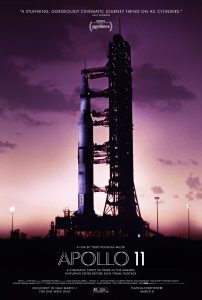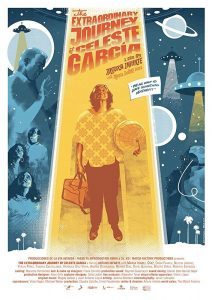Brent Marchant's Blog, page 81
March 19, 2019
Tune in for The Cinema Scribe
Tune in for the latest Cinema Scribe segment on Bring Me 2 Life Radio, today, March 19, at 2 pm ET, available by clicking here. And, if you don’t hear it live, catch it later on demand!


The post Tune in for The Cinema Scribe appeared first on Brent Marchant.
March 18, 2019
‘Apollo 11’ stirs the pride of accomplishment
“Apollo 11” (2019). Cast (Archive Footage): Neil Armstrong, Buzz Aldrin, Michael Collins, President Richard Nixon, President Lyndon Johnson, President John F. Kennedy, Walter Cronkite, Gene Kranz, Clifford E. Charlesworth, Charles Duke, Deke Slayton, Bruce McCandless II, Jim Lovell, Janet Armstrong. Director: Todd Douglas Miller. Web site. Trailer.
There was a time when the idea of reaching for the stars was a goal that was being pursued literally. It filled us with pride, enthusiasm and a spirit of adventure. It’s also something we seem to have lost in the years since then. Thankfully, though, there’s a new documentary that reminds us of that time, reigniting those feelings, at least for the time we’re seated in the movie theater, the stirring account of a truly historic space flight, “Apollo 11.”
In 1961, when President John F. Kennedy proposed the goal of sending a man to the moon and safely returning him to the Earth, the nation zealously rallied behind this ambitious initiative in a way rarely seen in the country’s history. It was looked upon as an enormous challenge, one full of unknowns and risks. But it was embraced with tremendous enthusiasm and an irrepressible “can do” attitude. And, after years of effort, determination and sacrifice, that noble prospect was about to be realized in 1969 with the historic launch of the Apollo 11 mission.
In July of that year, astronauts Neil Armstrong, Buzz Aldrin and Michael Collins embarked on their epic journey, backed by an army of flight engineers and technical and support staff, along with the collective encouragement of the American people and the citizens of the world. The pre-launch fervor was palpable and infectious. The fate of the intrepid trio was on everyone’s mind, with countless spectators assembled at the Kennedy Space Center and in front of their TV sets to witness the much-anticipated start of this incredible expedition, arguably the most significant event in the history of mankind.

As it lifts off from the Kennedy Space Center, the Saturn V rocket carrying the crew of the first manned mission to the moon soars into the heavens as seen in the excellent new documentary, “Apollo 11.” Photo courtesy of Neon.
Amidst great fanfare and set against the backdrop of a pristine azure sky on July 16, the enormous Saturn V rocket carrying the Apollo 11 crew blasted off into the cosmos. Onlookers stared in awe as the craft soared into the heavens. Thus began the heroic saga that a generation had awaited, its fulfillment nearly at hand.
Over the next four days, Apollo 11 made its way toward a rendezvous with its destiny. On July 20, the Eagle lunar lander separated from the spacecraft’s command module for its descent to the moon, where astronauts Armstrong and Aldrin took humanity’s first steps onto the surface of another world, truly a giant leap for mankind.
This remarkable documentary chronicles the moment-by-moment events that made up this legendary mission. Relying only on footage and audio recordings from the time, the film shows viewers what happened exclusively through the accounts of witnesses to the saga. Some of these materials will no doubt appear familiar, but others present details less known or not seen before. But, as impressive as this film is, what’s equally extraordinary is what’s shown and not told – the boundless captivation associated with this grand undertaking.
“Apollo 11” depicts this venture as the great endeavor it truly was, one whose occurrence resulted from an unparalleled effort by those directly involved in it and those who lent their backing to see it happen. This collectively inspired and manifested event is, arguably, the pinnacle of mankind’s accomplishments. It’s also a shining example of the conscious creation process at work, the philosophy that maintains we materialize the reality we experience through the power of our thoughts, beliefs and intents. And, given the joint nature of this undertaking, it shows the enormous power of co-creation, one that shows what we as a species are capable of when we pool our resources, both materially and metaphysically.

Standing on the surface of the moon, astronaut Neil Armstrong takes in the magnitude of this giant leap for mankind in the riveting new documentary, “Apollo 11.” Photo courtesy of Neon.
Given the magnitude of this mission and the larger program of which it was a part, it’s indeed remarkable to see what was accomplished, especially in light of the limited and far less sophisticated technology of the time. However, what’s even more astonishing is that this tremendous attainment originated with an idea, an intangible notion far removed from the physical fulfillment of this sought-after goal. In fact, that this accomplishment was eventually realized at all is truly mind-blowing, but, then, that also demonstrates the tremendous power inherent in our beliefs. If we can harness them to achieve something as astounding as this, imagine what else we might use them for. Such a realization, if employed routinely and jointly, could be used to solve the world’s problems and create grand new conceptions, leading us to other accomplishments as enviable as any footstep taken on the lunar surface.
The effort was not without its potential pitfalls, though. One of the chief hurdles for program participants was to overcome any fears they might have. With many having been test pilots, they were generally accustomed to taking envelope-pushing risks. However, given that this program’s undertakings involved largely untried technology, there were ample uncertainties going in, as evidenced by the various failures and tragedies that occurred along the way. To maintain forward momentum, those incidents had to be seen for what they were – learning experiences from which mistakes were to be ascertained and eliminated for the future. But confirmed beliefs in personal courage were essential in paving the way for such an outlook, an essential ingredient in the run-up to the Apollo 11 mission.

Astronaut Neil Armstrong prepares for his epic journey to the moon in the superb new documentary of this historic event, “Apollo 11.” Photo courtesy of Neon.
Of course, overcoming fears means overcoming a limitation, something that everyone associated with the space program and the Apollo 11 mission needed to do on a regular basis on a number of fronts. Getting to the moon wasn’t going to happen by playing it safe or thinking conventionally; it took fresh ideas and the implementation of never-before-tried conceptions, both of which called for pushing the boundaries of imagination and belief formation to come up with the means to make this cherished dream possible.
As noted before, though, the most significant element that made this venture work was everyone pulling together as a team. Having a collective goal can work wonders in uniting people, bringing them together for a jointly shared vision. Landing a man on the moon was perhaps one of the greatest examples of such a grand pooling of efforts. For those of us old enough to remember that time, it was something in which we all took pride, the kind of mutual undertaking we haven’t seen since – and that we could use today. Initiatives like building a border wall just aren’t in the same league as something as audacious as planting ourselves on another world.
This expertly crafted account of this epic mission is quite a film. It effectively captures the look and feel not only of the event, but also of the times in which it took place, effectively evoking feelings that are both nostalgic and prideful. It reminds viewers of a time when the country truly was great and its people had something to believe in, words to the wise for those of us living in a time that’s a mere shadow of what it once was.

Inspiration can be a tremendous motivator. Let’s hope that the encouraging example set in “Apollo 11” helps to restore those feelings, emboldening us to think, live and believe audaciously once again. And, this time, maybe we’ll reach those stars after all.
Copyright © 2019, by Brent Marchant. All rights reserved.
The post ‘Apollo 11’ stirs the pride of accomplishment appeared first on Brent Marchant.
March 15, 2019
This Week in Movies with Meaning
Reviews of “Captain Marvel,” “Birds of Passage” (“Pájaros de verano“) and “The Extraordinary Journey of Celeste Garcia” (“El viaje extraordinario de Celeste García“) are all in the latest edition of Movies with Meaning on the web site of The Good Media Network, available by clicking here.




The post This Week in Movies with Meaning appeared first on Brent Marchant.
March 14, 2019
‘Captain Marvel’ celebrates coming into our own
“Captain Marvel” (2019). Cast: Brie Larson, Samuel L. Jackson, Ben Mendelsohn, Jude Law, Annette Bening, Lashana Lynch, Clark Gregg, Gemma Chan, Djimon Hounsou, Lee Pace, Akira Akbar, Azari Akbar, Kenneth Mitchell, Mckenna Grace, London Fuller, Reggie/Gonzo/Archie/Rizzo. Directors: Anna Boden and Ryan Fleck. Screenplay: Anna Boden, Ryan Fleck and Geneva Robertson-Dworet. Story: Nicole Perlman, Meg LeFauve, Anna Boden, Ryan Fleck and Geneva Robertson-Dworet. Web site. Trailer.

Many of us have likely had experiences where we walk around in a fog wondering who we really are. Whether it’s determining the nature of our calling or the scope of our talents or some other consideration, from time to time we’ve all gone through episodes like this where we feel we’re lost and unable to find our way. There may be clues to help point the way, but they may be vague, fragmented or seemingly unrelated to one another, offering little assistance and perhaps confusing matters even more. Our best hope in situations like this is that a clear path will reveal itself to set us on our way, enabling us to become who we were meant to be. Such is the case with a hero in training seeking to discover herself and live up to her full potential, the central thrust of the thrilling new action-adventure saga, “Captain Marvel.”
On the planet Hala, home world of a race of noble warriors known as the Kree, Starforce cadet Vers (Brie Larson) is troubled by her dreams. These nighttime visions feature people and events that are ostensibly unknown to her but that also possess a strangely vague familiarity. That’s particularly true when it comes to images of a charismatic middle-aged woman who makes recurrent appearances. But the lack of ready answers to this conundrum bothers Vers; as someone who’s quickly riled and easily motivated to get to the bottom of matters, she grows restless with the lack of definitive resolution.

Superhero extraordinaire Captain Marvel (Brie Larson) sees her tremendous powers emerge thanks to a series of incredible events and profound introspection in the blockbuster new adventure, “Captain Marvel.” Photo by Film Frame © Marvel Studios, courtesy of Walt Disney Studios Motion Pictures USA.
Unsure what to do, Vers turns to her mentor and commander, Yon-Rogg (Jude Law), for advice. He recommends that she work on controlling her emotions (before they control her), especially in light of the magnitude of her ample special powers, such as an ability to blast powerful proton ray bolts from her fists. So, to attain the self-control and peace of mind she seeks, he encourages her to take an audience with the Supreme Intelligence, a fusion of consciousness and A.I. that governs and advises the Kree, particularly in matters of discovering and understanding their true selves.
Vers agrees with her mentor’s suggestions and decides to seek the S.I.’s counsel. This protean, enigmatic energy-based entity communicates with its petitioners by assuming the form of the individual each of them subconsciously most admires. For Vers, the S.I. takes the shape of the woman from her dreams (Annette Bening), affirming for her that this stranger is apparently someone for whom she holds a deep-seeded respect. But for what purpose?
Vers comes away from the experience no more enlightened than when she went in, although the visit apparently triggers enhanced recall of her repressed memories, which obviously must be important to her, even if she can’t determine their significance or pinpoint the source of their origin. She attempts to set the issue aside as she prepares for her next military assignment, a rescue mission to retrieve a Kree spy captured by the Skrulls, a race of shape-shifters with whom her people are at war. However, while carrying out her duties, Vers is captured by the Skrulls’ commander, Talos (Ben Mendelsohn). But, as someone who is not one easily detained, the resourceful cadet makes her getaway when an opportunity presents itself, fleeing in an escape pod that sends her barreling toward a mysterious planet designated C-53, otherwise known as Earth.

Starforce Leader Yon-Rogg (Jude Law) provides much-needed guidance to a wary cadet in the exciting new superhero release, “Captain Marvel.” Photo by Film Frame © Marvel Studios, courtesy of Walt Disney Studios Motion Pictures USA.
Separated from her peers in a place called Los Angeles in the year 1995, Vers desperately seeks to reunite with her fellow warriors. But, given their faraway location and the “primitive” communications technology of the planet on which she now finds herself, arranging a rendezvous takes some doing. And, considering that the cadet’s less-than-discreet arrival has drawn considerable attention from authorities, Vers scrambles to establish a low profile, not an easy task with both government officials and Skrull insurgents in hot pursuit.
In the midst of the chaos, Vers encounters Nick Fury (Samuel L. Jackson), an agent of a clandestine government organization known as S.H.I.E.L.D. (Strategic Homeland Intervention, Enforcement and Logistics Division). Given the extraordinary events unfolding around them, Fury is unexpectedly drawn into an investigation that’s far above his pay grade. Nevertheless, he’s so intrigued that he seeks to assist Vers in whatever way he can. Drawing upon his high-level clearances, Fury helps Vers gain access to secret government facilities where the mystery behind her dream images is slowly revealed.
“Vers,” as it turns out, is a variation on the name she went by when she lived the life of an earthly human, Carol Danvers, a test pilot who was allegedly killed in a crash six years earlier. What’s more, upon further investigation, Vers/Carol learns that the mysterious woman from her dreams was Dr. Wendy Lawson, a Kree aeronautics scientist pronounced dead in that same crash, who came to Earth in human form to secretly work on developing technology that she believed would end the war in which her people were bitterly embroiled. But, as significant as those discoveries are, they pale in comparison to the biggest one of all – the reason why Dr. Lawson was working on her technology in the first place, a revelation that makes clear much of what Vers has long believed about her world and her people is far from the truth.

Starforce cadet Vers (Brie Larson, left) and S.H.I.E.L.D. agent Nick Fury (Samuel L. Jackson, right) embark on an incredible earthly adventure in the year 1995 in the spellbinding new superhero release, “Captain Marvel.” Photo by Film Frame © Marvel Studios, courtesy of Walt Disney Studios Motion Pictures USA.
Armed with this information, Vers/Carol commits to seeing through Dr. Lawson’s goal. She joins forces with her onetime best friend, fellow test pilot Maria Rambeau (Lashana Lynch), along with Fury and several other unexpected allies (including Dr. Lawson’s specially gifted cat, Goose (Reggie/Gonzo/Archie/Rizzo)), to carry out this mission. It’s an undertaking that ushers forth an array of unexpected new developments for two worlds at war. But, on a personal level, it also brings about significant changes in the protagonist herself, empowering new attributes that are truly something to marvel at.
The incredible journey of this remarkable woman is truly something to see, not only in terms of the extraordinary nature of the circumstances, but also with regard to the personal transformation she undergoes. Her true self emerges from her inner depths, surfacing to take its rightful place in her world. It’s a process that calls upon Vers to take an introspective look at who she really is, an endeavor requiring her to grasp the beliefs that define her character. Understanding those notions is fundamentally important, for they shape the reality of who she is and what she experiences, cornerstone principles of the conscious creation process, the philosophy that maintains we tap into our thoughts, beliefs and intents to manifest the existence around us.

Skrull commander Talos (Ben Mendelsohn) takes on his worthy enemies, the Kree, in the self-titled origin story of superhero “Captain Marvel.” Photo by Chuck Zlotnick © Marvel Studios, courtesy of Walt Disney Studios Motion Pictures USA.
During her time on Hala, Vers has only a vague sense of who she is. It bothers her, too, which is why she so earnestly seeks to create the conditions that will eliminate that uncertainty. This explains her experiences with the Supreme Intelligence, her repressed memory recall and her eventual journey to Earth, all of which set up the opportunity for the truth to emerge – and for her true nature to come out.
This process involves not only a revelatory understanding of her present circumstances; it also requires her getting in touch with a past of which she knows virtually nothing. It calls for her to get in touch with experiences deeply buried in another time, not only the events themselves, but also her beliefs about them. Accessing these feelings provides valuable insights into her younger self, first as a child (London Fuller) and then as an adolescent (Mckenna Grace). Vers/Carol sees who she was, an adventurous spitfire who was often discouraged from partaking in activities in which girls weren’t supposed to engage, an attitude routinely promoted by authority figures, such as her father (Kenneth Mitchell).

Test pilot Carol Danvers (Brie Larson, right) and her best friend, Maria Rambeau (Lashana Lynch, left), seek to soar to new heights in the thrilling new action-adventure saga, “Captain Marvel.” Photo by Film Frame © Marvel Studios, courtesy of Walt Disney Studios Motion Pictures USA.
As discouraging as these positions were, though, young Carol refused to let them hold her back. She believed in herself and her abilities and didn’t hesitate to act upon them in materializing the existence she experienced. It’s what enabled her to become a test pilot, for example. And, in a less than conscious way, it’s also what allowed her to become a Starforce cadet, even though she wasn’t fully aware of what she was getting herself into. But, as difficult as this path was, it’s also what brought forth the ultimate expression of her true self as a seeker of peace and a protector of the downtrodden, her emergence as a superhero, Captain Marvel.
Captain Marvel’s accomplishments go beyond her feats of heroics; they reveal her as a character who can do more than just beat up the bad guys. They also reveal her as someone who is a shining beacon of compassion, one who cares profoundly for the needs and well-being of others, particularly those who are unable to adequately fend for themselves. But, even more importantly, they show her as an example of someone who deeply inspires others, particularly those of her gender, such as Maria’s preteen daughter Monica (Akira Akbar), a youngster cut from the same cloth as her beloved Auntie Carol.

Plucky feline Goose (Reggie/Gonzo/Archie/Rizzo) proves to be quite a formidable ally and adversary in the superhero action-adventure, “Captain Marvel.” Photo by Chuck Zlotnick © Marvel Studios, courtesy of Walt Disney Studios Motion Pictures USA.
All of these attributes are reflective of the conscious creation principle known as value fulfillment, the concept that we live our lives as our best, truest selves for the betterment of ourselves and the world around us. Vers/Carol/Captain Marvel has much to offer us – and herself – by allowing her innate qualities to come to the surface. This aspect of the protagonist’s story is perhaps as important as anything she does to vanquish the evildoers, revealing what truly makes a superhero “super.”
Hands down, “Captain Marvel” is the best superhero movie I’ve seen in quite some time. It’s excellent in every regard – well written and well acted, without an overreliance on action or special effects gimmickry to carry the story. Oscar-winning actress Brie Larson, while best known for her dramatic turns in films like “Short Term 12” (2013) and “Room” (2015), seamlessly steps into the role of superhero, capably supported by a cast of colorful supporting players who add humor, intrigue and warmth to a well-constructed narrative. Frankly, I don’t care how well or how poorly this offering fits into the larger Marvel Comics Universe mythology or the overall marketing strategy of the franchise; I judge a film on its individual merits, and, on this score, this picture succeeds brilliantly on every front. This release does what a movie of this genre should – entertain, inspire and leave viewers feel as though they’ve genuinely gotten their money’s worth from the theatrical experience.

Former test pilot Carol Danvers-turned Starforce cadet Vers emerges as a formidable superhero in the self-titled origin story of “Captain Marvel.” Photo by Chuck Zlotnick © Marvel Studios, courtesy of Walt Disney Studios Motion Pictures USA.
Breaking through the barriers that keep us from seeing, understanding and appreciating the truth about ourselves can be a genuinely fulfilling experience. It allows us to assess and draw upon our own unique set of personal capabilities, skills and talents that have the potential to do a lot of good in the world – and beyond. The example offered here provides us with a tremendous source of inspiration to see this through – and to attain goals that are super in every sense of the word.
Copyright © 2019, by Brent Marchant. All rights reserved.
The post ‘Captain Marvel’ celebrates coming into our own appeared first on Brent Marchant.
March 11, 2019
‘Birds of Passage’ cautions us to consider what we create
“Birds of Passage” (“Pájaros de verano”) (2018 production, 2019 release). Cast: José Acosta, Natalia Reyes, Carmiña Martínez, Jhon Narváez, Greider Meza, José Vicente Cotes, Juan Bautista Martínez, Sergio Coen, Aslenis Márquez, José Naider, Yanker Díaz, Joaquín Ramón, Luisa Alfaro, Natalia Pinzón, Sebastián Celis, Alice Lebadie, Dennis Klein, Gabriel Mangones, Rosario Epieyú. Directors: Cristina Gallego and Ciro Guerra. Screenplay: Maria Camila Arias and Jacques Toulemonde Vidal. Story: Cristina Gallego and Ciro Guerra. Web site. Trailer.
We all love it when we come up with what we think of as a great idea. We envision possibilities for success that meet, if not exceed, our expectations. But how often do we think through such notions thoroughly? Failing to do so can carry significant implications, some that may even threaten the existence we know and enjoy. Such is the case for a tribe of native people flirting with the ways of the modern world in the captivating new Colombian release, “Birds of Passage” (“Pájaros de verano”).
It’s amazing how quickly life can change. For the Wayúu people of Colombia’s northern Guajira Peninsula, their long-established way of life did just that in the late 1960s – and not for the better. That story is the stuff of which this fact-based film is made.
In 1968, when the young and lovely Zaida (Natalia Reyes) emerges from a year of confinement during which she transforms from an adolescent into a woman, the community celebrates her arrival into adulthood – and her availability to take a mate. Would-be suitors vie for her hand, but the potential beau most anxious to wed her is the handsome young Rapayet (a.k.a Rafa) (José Acosta). However, despite his desire and determination to woo Zaida, Rafa has something of a reputation weighing him down. If he’s to win her hand, he’ll have to prove himself especially worthy, and he’ll need all the help he can muster.

Rafa (José Acosta, left) and Zaida (Natalia Reyes, right) engage in an ancient courting ritual of Colombia’s Wayúu people in the captivating new release, “Birds of Passage” (“Pájaros de verano”). Photo by Jenna Martin, courtesy of The Orchard.
Fortunately, Rafa has the strong support of his uncle, Peregrino (José Vicente Cotes), who eagerly talks up his nephew’s many accomplishments in making up for the past and in becoming a successful businessman, particularly in his dealings with the alijunas (outsiders not to be readily trusted). But, even with such backing, Rafa faces an uphill battle in convincing Zaida’s mother, Úrsula (Carmiña Martínez), the tribe’s formidable matriarch, to grant him what he seeks.
After lengthy discussions, Úrsula reluctantly agrees to give her daughter’s hand to Rafa if his family can come up with a sizable dowry, one that’s unusually large compared to most typical arrangements. Rafa agrees to the terms, despite Peregrino’s doubts about his nephew’s ability to fulfill the request. What’s more, even after Rafa pledges his word to his future mother-in-law, Úrsula reiterates her reservations; as one who possesses the gift of prophecy and is well-versed in her people’s ancient spiritual ways, she senses Rafa will bring trouble to her family, despite his reassurances that he’ll provide well for Zaida and her clan while honoring the tribe’s customs.
With the arrangements set, Rafa goes about raising the funds he’ll need to pay for the dowry. He deals in various crops, such as coffee beans, with his alijuna friend, Moisés (a.k.a. Moncho) (Jhon Narváez), but the money these transactions generate is far from sufficient to meet his obligations. Things change, however, when the duo meets Peace Corps volunteers (Sebastián Celis, Alice Lebadie) looking for what brought them to Colombia in the first place – marijuana. And, when Rafa and Moncho learn how much the Americans are willing to pay for it, they realize they have a lucrative new business opportunity staring them in the face, one that will cover the cost of the dowry and then some.

Having emerged from a year of confinement in which she transformed from an adolescent into a woman, Zaida (Natalia Reyes) entertains the proposals of would-be suitors in “Birds of Passage” (“Pájaros de verano”). Photo by Nic Izzi, courtesy of The Orchard.
To fulfill their pending order with the gringos, Rafa visits his cousin Aníbal (Juan Bautista Martínez) at his mountain plantation. Aníbal grows marijuana but not in large amounts. Rafa tells his cousin that his customers are willing to pay a hefty price for his crop, one that could turn a tidy profit for both of them and likely lead to an ongoing source of new business. He proposes buying Aníbal’s entire stock to get the ball rolling, a venture that promises to be worthwhile for all concerned. Rafa thus earns the cash to more than cover the dowry; party boy Moncho gets the funds to live larger than he ever dreamed; Aníbal raises the money needed to expand his production; and the gringos get the best pot they’ve ever smoked, and they like it so much that they look to expand their arrangement with the locals, one that’s built on a hefty export business.
Before long, Rafa and Zaida are happily married, the proud parents of two children, Miguel (José Naider) and Indira (Aslenis Márquez). The rest of the family benefits, too, especially Úrsula and Peregrino, who live better than they ever have. Zaida’s younger brother, Leonides (Greider Meza), gets in on the act as well, taking full advantage of the clan’s newfound wealth.
However, despite such tremendous success, as the new decade descends and the demand for pot surges, the once-small-time family dealers see their operation turn into a big business. Suddenly, Rafa and his cohorts must contend with new issues like a stepped-up need for security, competition from rivals and constant government scrutiny necessitating payoffs to officials like the vigilant Corporal Ramírez (Gabriel Mangones), who never misses taking his cut. Such measures require discipline and an orderliness that won’t allow for the intrusion of sloppiness, carelessness or a lack of discretion, behavior becoming increasingly typical of Moncho and Leonides. This change in circumstances calls for changes in practices and procedures in which everyday practicalities come into conflict with longstanding tribal customs and traditions, as well as individual behavior. Some of the adjustments don’t go over well, leading to disagreements, disruption and even death.

Tribal matriarch Úrsula (Carmiña Martínez) makes decisions aimed at benefitting her people, as well as herself, in the engaging new Colombian release, “Birds of Passage” (“Pájaros de verano”). Photo by Jenna Martin, courtesy of The Orchard.
Despite tremendous prosperity, Úrsula’s initial concerns, it would seem, start to surface. But, then, Úrsula, like so many other members of the family, has never turned away from availing herself of the wealth that dealing pot has brought them. The bottom line here is that the greed produced through this venture has torn the family apart, corrupting its members and leading to a civil war (or, more accurately, a wholly uncivil war) amongst all involved, a conflict that threatens to wipe out the clan’s culture, destabilize the entire region and disrupt the way of life of the Wayúu people collectively. The reverence and grace that once characterized this tribe of noble souls is on the verge of being lost – and for what? Ego pride? Rampant materialism? Money? This is the question everyone must now ask themselves before it’s too late – if it’s not already.
It’s been said that necessity is the mother of invention, and Rafa finds that out for himself when he searches for the means to address the dowry requirements. He sincerely believes he must come up with a solution, a notion that drives his thoughts, intents and actions, the cornerstones of the conscious creation process, the philosophy that maintains we draw upon these resources to manifest the reality around us. But, in tapping into the wisdom of this adage, he – like all of us – would be wise to carefully consider what we invent to address our needs.
As practiced conscious creators are well aware, our employment of the process is accompanied by a number of important considerations, such as our responsibility for what we materialize and the consequences associated with what results. Where Rafa’s undertaking is concerned, these issues should be obvious. And, based on how events play out, it’s apparent he hasn’t give much thought to them. He is preoccupied with achieving his objective with little regard for the fallout, a practice more commonly known as un-conscious creation or creation by default.
Not all of the blame rests with Rafa, though. Everyone involved in this scenario plays a part in manifesting this co-creation. Úrsula, Peregrino, Aníbal, Moncho and Leonides, for instance, all have agendas they want fulfilled and will do whatever it takes to see them realized, again all from the standpoint of un-conscious creation. Úrsula’s behavior is particularly appalling in that she takes such a hypocritical, holier-than-thou stance when circumstances go awry without ever acknowledging how she’s personally benefitted from the success of the operation.

A family of small-time drug dealers looks to the future as they watch their operation grow into a big business, a change prompting significant alterations in the lives (from left) of Peregrino (José Vicente Cotes), Leonides (Greider Meza), Úrsula (Carmiña Martínez), Rafa (José Acosta) and Zaida (Natalia Reyes) in “Birds of Passage” (“Pájaros de verano”). Photo by Nic Izzi, courtesy of The Orchard.
Such belief conflicts often yield confused results. That’s because the underlying beliefs directing them are fundamentally at odds with one another. That kind of contradiction often leads to skewed outcomes, mainly because our divine collaborator is unable to sort out the conflicted requests being made of it. Is it realistic, for example, to expect that the materialization of unchecked criminal activity will somehow produce harmonious, risk-free outcomes?
On a larger scale, there are belief conflicts here involving the preservation of traditions and the establishment of new ventures. The old world and the modern one clash with one another, one that almost assures chaos and disruption. And hoping that the two can somehow be maintained without discord is impractical and unrealistic, as the Wayúu come to find out for themselves.
Maintaining our presence of mind is crucial in such situations, especially when it comes to preserving an established and agreeable way of life. We need to remind ourselves of such matters and keep them at the forefront of our beliefs, which is why we need elements in our realities that serve that purpose. Such is the role played by a singing shepherd (Sergio Coen), one who recants the stories of the old ways and the old beliefs as told through native songs, works that serve as the overarching templates for each of the film’s various chapters. The key question, of course, though, is anyone listening? That’s a word to the wise for all of us, not just the native Colombians in this story.

Though occasionally predictable and somewhat meandering in the middle, this excellent offering on the rise of the drug trade and its impact on the country’s native people is otherwise well-executed on all fronts. With fine performances, beautiful cinematography and a nuanced though sometimes-rote script, “Birds of Passage” succeeds in telling a familiar story in an unfamiliar setting. This title, from the creators of the Oscar-nominated feature “Embrace of the Serpent” (2015), is time very well spent. The film, which has primarily been playing the festival circuit, is currently in limited release at theaters specializing in foreign, independent and arthouse pictures.
The search for paradise is something we crave, but sometimes we’re unaware we’ve already attained it. It’s only when it starts to slip away that we begin to appreciate what we’ve lost. That’s a tragedy, to be sure. But, if we take the time to consider what we’re creating – and how our tampering might be causing the grave disappearance of what we’ve so carefully sought to cultivate – we may be able to forestall such a tragic loss. Doing so may enable the birds of passage to pass on by rather than bring about a passing we’d rather not experience.
Copyright © 2019, by Brent Marchant. All rights reserved.
The post ‘Birds of Passage’ cautions us to consider what we create appeared first on Brent Marchant.
March 5, 2019
‘Blame’ searches for the nature of underlying truths
‟Blame“ (2017 production, 2018 release). Cast: Quinn Shephard, Nadia Alexander, Chris Messina, Tate Donovan, Tessa Albertson, Marcia DeBonis, Luke Slattery, Owen Campbell, Geneva Carr, Sarah Mezzanotte, Larry Mitchell, Lily Houghton, Elizabeth Ann Howell, Carlyle Owens, Trieste Kelly Dunn. Director: Quinn Shephard. Screenplay: Quinn Shephard. Story: Laurie Shephard and Quinn Shephard. Web site. Trailer.
Getting to the root of unethical or illegal behavior sometimes takes some doing. It may require considerable digging and ruling out what is initially looked upon as seemingly obvious. It might even involve traversing some highly unexpected paths to expose the culprits and their well-concealed misdeeds. There’s even the possibility that there may be more going on than meets the eye. So it is with life at an emotionally charged high school as seen in the seductive drama, “Blame,” now available on DVD and video on demand.
Sensitive but troubled teen Abigail Grey (Quinn Shephard) is about to return to high school after undergoing treatment in a mental health facility for an undisclosed disorder. All indications are that she’s doing better, and her parents (Elizabeth Ann Howell, Carlyle Owens) believe she’s ready to resume her regular routine. Abigail’s not so sure, but she goes along with the plan, despite her apprehensions.
Abigail’s biggest worry is how she’ll be treated by her peers, and, on this front, she has legitimate reasons for concern. Bullying and humiliation, it seems, are common practices at her school, especially the kind routinely doled by manipulative mean girl Melissa Bowman (Nadia Alexander) and her various cronies, Sophie (Sarah Mezzanotte), Ellie (Tessa Albertson), Eric (Luke Slattery) and TJ (Owen Campbell). Melissa even has a pet nickname for Abigail, callously referring to her as “Psycho Sybil,” an offensive, exceedingly hurtful reference to the title character of Flora Rheta Schreiber’s 1973 book about the treatment of a young woman afflicted with dissociative identity disorder (formerly known as multiple personality disorder).

Life is complicated for troubled teen Abigail Grey (Quinn Shephard, right) when bullied by mean girl Melissa Bowman (Nadia Alexander, center) and her cronies (from left), TJ (Owen Campbell), Eric (Luke Slattery), Sophie (Sarah Mezzanotte) and Ellie (Tessa Albertson) in the seductive drama, “Blame,” now available on DVD and video on demand. Photo courtesy of Samuel Goldwyn Films.
Needless to say, such cruel treatment makes Abigail’s return to school difficult. Fortunately, she’s able to find some solace in her drama class, a subject she seems to enjoy and one in which she receives ample encouragement from her teacher, Mrs. Howell (Geneva Carr), who also helps to shield her against malicious onslaughts from the resident bullies. However, when Mrs. Howell goes on maternity leave, Abigail’s future in the class is thrown into jeopardy. Thankfully, though, her fears are soon vanquished with the arrival of a kindly substitute, Jeremy Woods (Chris Messina), who takes a special interest in Abigail when he sees how unfairly she’s being treated by her classmates. But, even more than that, he’s also sufficiently impressed at how much talent she possesses.
Jeremy thus becomes both a protector and patron for Abigail. He intervenes on her behalf when she comes under attack from Melissa and her cohorts. And, to encourage the development of her acting ability, he assigns her the plum role of Abigail Williams in the class production of Arthur Miller’s The Crucible, a part that Melissa also wanted. Needless to say, being relegated to Abigail’s understudy brings out the worst in Melissa, prompting her to ramp up her menacing machinations and making her rival’s life ever more difficult. But, whenever the need arises, Jeremy steps in to shelter his prize pupil to see that she’s getting a fair shake on all fronts.
Because of all this attention, Abigail quickly begins taking quite a liking to Mr. Woods – and he to her. The relationship between teacher and student begins to grow more complicated and precarious. Each thinks about the other constantly, causing new problems, such as troubles in Jeremy’s relationship with his girlfriend, Jennifer (Trieste Kelly Dunn). And, when Abigail’s classmates begin getting wind of what’s going on, innuendo starts making the rounds, providing Melissa with new ammunition to smear the reputation of her classmate and, potentially, that of her teacher if she doesn’t get what she wants. Suddenly Jeremy’s choice of The Crucible for a class production takes on a whole new irony of its own.

A special – and potentially inappropriate – relationship forms between troubled teen Abigail Grey (Quinn Shephard, left) and substitute teacher Jeremy Woods (Chris Messina, right) in writer-actor-director Quinn Shephard’s premiere feature, “Blame.” Photo courtesy of Samuel Goldwyn Films.
As questions of propriety swirl, Jeremy begins pulling back. But this leaves Abigail confused about his feelings toward her, a development that threatens to undo all the progress she’s made at becoming psychologically stable once again. In his attempt to offer help, he may have inadvertently made matters worse, and, with rumors of a possible inappropriate relationship rearing their ugly head, there could be even more at stake, especially when Melissa fans the flames of speculation.
But, as strange as all of the foregoing twists and turns have been, even more lie ahead – and they have the potential to affect those least expecting them. How everything plays out for all concerned raises serious questions about who’s really at fault and for what. The answers to the thorny questions raised here indeed carry the seeds of surprise, but sometimes it takes circumstances as complicated as these for the truth to be liberated – and to see where the blame for things really lies.
Situations like this frequently raise the question, “Why must we always make things so needlessly complicated?” In a civil world, much of the behavior on display here would be seen as patently unacceptable and inherently unnecessary. Yet here it is nevertheless. One can’t help but want to investigate how and why it arises in the first place.
The “how” of this is actually quite simple – like anything that crops up in our experience, it appears as a result of the conscious creation process, the philosophy that maintains we manifest the reality we experience through the power of our thoughts, beliefs and intents. But the “why” behind this is a trickier proposition. Considering the incendiary complications associated with these circumstances, not to mention the potentially explosive consequences that accompany them, one might wonder why any of the characters would want to create them, especially since they carry the seeds of needing to lay blame, as the film’s title suggests, at the foot of the responsible parties.
Convoluted situations like this often lead to the unraveling of complex scenarios that have long gone unaddressed and/or that frequently involve significant life lessons, revealing the kinds of profound insights that often surface through personal introspection or even psychotherapy. It also may involve the exposure of hidden truths that are masked by outward and seemingly inexplicable behavior. Why, for example, does Melissa feel so compelled to be such a bitch, especially toward someone as inoffensively harmless (and easily hurt) as Abigail? Melissa’s cruelty is so extreme and her manipulations are so conniving that even her friend Ellie eventually gets turned off by them.

Bad girl Melissa Bowman (Nadia Alexander) hatches one of her many schemes to get her way in “Blame,” now available on DVD and video on demand. Photo courtesy of Samuel Goldwyn Films.
So what’s going on here? Is this a case of inherent evil emerging? Or is it something else, such as an unconscious projection of personal insecurities onto someone less able to fight back and defend herself? A look at Melissa’s dysfunctional home life, especially the heavy-handed, often-insensitive treatment doled by her stepfather (Tate Donovan), proves revelatory, but why take out those frustrations on Abigail? Maybe Melissa has feelings she’s not yet ready to deal with but can’t bear to keep them bottled up and thus needs to have some kind of outlet, such as an easily victimized target, like Abigail, on which to dump them.
And, speaking of Abigail, what role is she playing in this? Given that her relationship with Melissa is a co-creation, Abigail obviously plays a hand in its manifestation, but to what end? Could it be that her disempowered nature is serving as a mirror for her nemesis? What’s more, given Abigail’s unexpected success in drama class, is she setting an example to show others how they can overcome the same kinds of difficulties she’s been experiencing and excel? Her efforts in these areas may not be readily apparent, and she may have chosen a hard path to bring them into being, but if they’re understood and appreciated at some point, their impact could be substantial both in inspiring others and in helping her to heal herself.
Then there’s Jeremy. Why is he allowing himself to be drawn into a potentially career-ending and criminal involvement, especially since his actions may end up doing more harm than good? He knows it’s wrong, yet he can’t help but be tempted by the opportunity when it presents itself.
But is his relationship with Abigail truly about romance? While it might be to a certain degree, there’s potentially something else going on here, namely, a desire for Jeremy to be honest with himself, particularly when it comes to attaining what he wants. The onetime aspiring actor drifts from job to job, accepting temporary positions – such as his gig as a substitute drama class teacher – to hold him over, but never taking the initiative to be honest with himself about his heart’s desire or the steps needed to see it realized. Maybe the desire he feels for Abigail is intended to awaken this trait in him and to prompt him to adapt it to areas of his life where it clearly could stand to be implemented. Of course, he needs to get clear about what Abigail’s presence in his life truly means and not to misinterpret the passion she inspires in him as something other than what it really is.

A similar case can be made for why Jeremy is present in Abigail’s life. He encourages her, filling her with confidence and prompting her to develop and employ her sense of personal power. She needs this, both to develop her acting abilities, as well as to protect herself against the onslaught of personal attacks coming her way.
Clearly there’s a lot bubbling beneath the surface here, and many of the camouflaged elements covering them at the surface are keeping these issues from being recognized, let alone addressed. That’s how these situations end up becoming needlessly complicated. However, sometimes these masked elements need to be in place so that the potency of the revelations they eventually help to uncover are heightened and impactful, leaving a significant impression on those who need to get the messages they impart. Of course, the underlying meanings of these situations need to be discerned if they’re to have any value, because, if they’re not, misunderstandings surely arise, and that can lead to the consequence of blame needing to be assigned, something that ultimately benefits no one. High school, it would seem, could be a place of learning important lessons other than what’s taught in the classroom.
Though at times a little predictable and at other times a little underdeveloped, this premiere feature from 24-year-old writer-actor-director Quinn Shephard nevertheless shows her tremendous promise as a filmmaker. In this coming of age tale that combines elements of pictures as diverse as “Lolita” (1962), “Heathers” (1988) and “Carrie” (1976) (without the psychic aspects), Shephard explores topics ranging from mental health to emerging sexuality to inappropriate relationships to bullying in a thought-provoking yet entertaining vehicle. Shephard also turns in a fine performance as a misunderstood teen, backed by an equally strong portrayal by Nadia Alexander as her bad girl rival. Having been nominated for an Independent Spirit Award for best first screenplay, this film is available for screening through various home viewing options.
Sometimes we’re all too quick to point the finger at others for their behavior. But, as the old saying goes, when one finger is pointed at someone, there are three others pointed back squarely at us. What’s more, when circumstances are fundamentally misinterpreted because the truth is obscured, assessing them can be more problematic than one might assume. Assigning blame for such situations thus proves to be a trickier proposition than what might be apparent at first glance. Consequently, we must be careful where we direct those digits of ours; it could prove to be a more painful and humiliating experience than we anticipate.
Copyright © 2019, by Brent Marchant. All rights reserved.
The post ‘Blame’ searches for the nature of underlying truths appeared first on Brent Marchant.
March 4, 2019
Tune in for The Cinema Scribe
Tune in for the latest Cinema Scribe segment on Bring Me 2 Life Radio, today, March 5, at 2 pm ET, by clicking here. And, if you don’t hear it live, catch it later on demand!


The post Tune in for The Cinema Scribe appeared first on Brent Marchant.
March 2, 2019
‘Celeste Garcia’ explores how to get what we really want
“The Extraordinary Journey of Celeste Garcia” (“El viaje extraordinario de Celeste García”) (2018). Cast: María Isabel Díaz, Omar Franco, Néstor Jiménez, Yerlín Pérez, Tamara Castellanos, Veronica Diaz, Roberto Espinosa, Reinier Díaz, Andrea Doimeadios, Beatriz Viña. Director: Arturo Infante. Screenplay: Arturo Infante. Web site. Trailer.
Much of our life is spent just trying to figure out how it all works. This leaves us little time to devote to attaining what we really hope for out of it. And, even then, we may not get it right through many attempts at doing so. But, at some point, we just might hit upon the right formula, one that gives us the happiness and contentment we seek. Such an odyssey is the stuff of one women’s pursuit to find a life that suits her as detailed in the offbeat new Cuban comedy, “The Extraordinary Journey of Celeste Garcia” (“El viaje extraordinario de Celeste García”).
Former school teacher Celeste Garcia (María Isabel Díaz) has led an often-difficult life, but the single, sixty-something retiree is now hoping her golden years in Havana will turn out better. She spends much of her time in the company of her Russian neighbor and volunteers as a docent at the local planetarium. Life’s admittedly far from perfect, but the spry senior enjoys a reasonably comfortable, albeit rather routine, existence, at least by present-day Cuban standards. But, while at home late one night, matters take a rather drastic and unexpected turn.
In the middle of a sound sleep, Celeste is awoken by an exceptionally bright light and strange sounds coming from her neighbor’s apartment. Celeste is mystified by these unusual happenings, so she decides to investigate. Upon entering the adjacent unit, however, she gets quite an eyeful; she finds herself in the company of several odd-looking individuals, beings who are unfamiliar and certainly not immediately recognizable as human. She doesn’t quite know what to make of this, but she doesn’t hang around to find out, quickly returning to her apartment and trying to ignore what she just witnessed.
The next day, she finds her apartment building crawling with authorities. She also learns that her neighbor is gone. But, rather than make waves, she essentially puts her head down and blinders on in an attempt to pay no attention to what’s going on. Before long, though, the truth of what’s happening is revealed through official TV news reports. It seems that Cuba has long been home to alien representatives from the planet Gryok, and the visitors now want to establish an exchange program with their earthly hosts, graciously extending an invitation to journey to their home world. And, with that revelation, Celeste strongly suspects her neighbor probably wasn’t Russian after all.
Demand for the exchange program is heavy, so the government establishes a lottery program to select its contingent of qualified applicants. Celeste’s friends and family encourage her to apply, believing that it would provide the lonely and unattached retiree with a fresh start, especially since it’s an opportunity that would feed her interest in astronomy. But Celeste says she has no desire to go, that she’s perfectly content to remain earthbound.

Former school teacher Celeste Garcia (María Isabel Díaz) hopes that an invitation by extraterrestrials to visit their home world will bring happiness to her lonely and unfulfilled life in the offbeat comedy, “The Extraordinary Journey of Celeste Garcia” (“El viaje extraordinario de Celeste García”). Photo courtesy of The Match Factory.
Despite her lack of interest in the exchange program, Celeste is nevertheless curious to find out what actually happened to her neighbor, so she decides to visit the office of the government agency overseeing the lottery to see if it has any information about her vanished friend’s whereabouts. While there, Celeste learns that her alleged Russian acquaintance had indeed been masquerading as a human for years, but that revelation pales in comparison to an even bigger surprise: It seems Celeste’s neighbor recommended her for the exchange program, making a reserved slot available to her with no need to go through the uncertainty of the lottery process.
So why did Celeste’s neighbor accord her such special treatment? Having been a teacher, Celeste is considered a superior being (for a human at least) and is looked upon as the kind of enlightened, uplifting individual that Gryokians (like her neighbor) believe make her an ideal candidate for inter-species exchange. The off-worlders are convinced they can learn as much from her as she can from them.
As word of the exchange program spreads, Cuba’s would-be space travelers grow more curious about the planet they hope to visit. Gryok, it seems, is quite an intriguing place – very earth-like in many ways but sufficiently different in others. For example, the distant world is home to animals not unlike those found on terra firma, but with some significant distinctions. Gryok’s chickens, for instance, are 20 feet tall (imagine the size of the eggs).
Having essentially been given a free pass to make the trip, Celeste is welcome to go if she wishes. And, given the number of lottery applicants, she’s thought of as quite the lucky soul. As she learns more about the faraway planet, her interest is piqued, fueled by the encouragement of her sister, Luisa (Beatriz Viña), and her son, Pedrito (Roberto Espinosa), who note how many others wish they were in her shoes. So, after some additional thought, Celeste comes to recognize that there’s really nothing holding her here, a realization that prompts her to accept the offer to journey into the cosmos.
To prepare for the trip, Celeste and the lucky lottery winners are sent to a special training camp housed in a cramped, abandoned, run-down school in the Cuban countryside. Along the way, Celeste meets an interesting array of fellow travelers, including a flamboyant retired musician, Hector (Néstor Jiménez), a feisty, mouthy middle-aged woman, Perlita (Yerlín Pérez), and an expectant young mother, Mirta (Tamara Castellanos). She also runs into a familiar face, Augusto (Omar Franco), her neighborhood butcher, a gentlemanly senior who, without fail, inconspicuously takes care of his favorite customer while quietly swooning for her from afar. And, to make sure everyone learns their preparatory lessons, the aspiring travelers are placed under the supervision of a despotic government apparatchik, Zobeida (Veronica Diaz), a civil servant on steroids who approaches her duties with the efficient, impersonal, perfunctory attitude of a drill sergeant.
As Celeste goes through her training, however, she begins to discover that this supposedly coveted opportunity may not be everything it’s cracked up to be. In addition to Zobeida’s routine bullying, incessant barking and relentless criticisms, the bureaucracy of getting processed, and a variety of other issues, Celeste grows increasingly disillusioned. The once-hopeful prospect for a new beginning starts serving up the same kind of disappointment and frustration that has characterized much of her life.
What’s more, not everything is above board, either. Wannabe travelers who haven’t qualified for the trip are camped out on the periphery of the training facility, looking for ways to scam themselves into a ticket. Such is the case with a young couple, Yunier (Reinier Díaz) and Malu (Andrea Doimeadios), who are on the run from the law for a crime of passion they committed, hopeful that the Gryokians haven’t yet established any extradition arrangements with their earthly colleagues. There’s a problem, though; while Yunier has been approved for the journey, Malu has not and is desperately looking for a way to get on board. They’ll do just about anything to get what they want, too, including taking advantage of the good graces of legitimate travelers – like Celeste.

Former school teacher Celeste Garcia (María Isabel Díaz, second from right) discusses her hopes for a new life on an alien planet to which she’s been invited with fellow travelers Hector (Néstor Jiménez, second from left), Perlita (Yerlín Pérez, right) and Mirta (Tamara Castellanos, left) in the offbeat new Cuban comedy, “The Extraordinary Journey of Celeste Garcia” (“El viaje extraordinario de Celeste García”). Photo courtesy of The Match Factory.
With the time of the rendezvous with the mother ship fast approaching, circumstances grow increasingly tense. So how will everything shake out? That remains to be seen as the confluence of the film’s various story threads come together to reveal an outcome that surprises everyone – both on and off the screen. A curious mix of heartache, contentment and unforeseen affiliations will leave everyone – even the aliens – scratching their heads at how things turn out. But, if an odyssey like this is genuinely meant to be a trek into the unknown, Celeste Garcia’s extraordinary journey truly lives up to every bit of its billing.
Creating the life we want for ourselves is, obviously, up to us. But many find that they fail at this, and they’re usually not sure why. In large part, though, it usually comes down to either not really knowing what we want or allowing ourselves to be unduly imprinted with the influences of others. Such impacts serve to shape our thoughts, beliefs and intents, the building blocks of the conscious creation process, the philosophy that maintains we use these metaphysical tools to manifest the reality we experience.
From this, it’s easy to see that, if we don’t have a good handle on our beliefs, we don’t have a good handle on the reality we materialize. Such is the case with Celeste; as dear and sweet as she is, she’s also something of a push-over, letting others around her determine what she should want rather than allowing herself to decide those matters for herself. But, when she discovers that what others want or recommend isn’t necessarily what she wants, she invariably runs into trouble. That’s something that has plagued her much of her life, and it’s reared its head once again when it comes to making a decision about whether to accept the Gryokians’ invitation (and hence the issues she experiences in the training camp).
To a certain extent, that’s not to be unexpected in a society, like Cuba, where officials make the decisions for all of its citizenry. Indeed, is it realistic to believe that individuals can learn to think for themselves when they’re constantly being told by authorities what they’re supposed to think? Such circumstances would appear to speak volumes for why Celeste finds herself in the situation that she’s in (and probably always has been).
In that regard, then, this film is as much a commentary on the state of Cuban politics and society as it is about the life of a woman seeking to find her way in the world (or on another planet). Those who quietly and compliantly always follow the rules, like Celeste, may not get into trouble, but they may also often find themselves less than satisfied with the results. Meanwhile, those who are willing to pursue what they actually want, like Yunier and Malu, frequently find that they must break the rules to reach their objectives, a potentially perilous course but one that at least allows them to think for themselves. Thus, in its own way, this picture quietly examines the roles of the group and the individual in society and how those influences factor into the manifestation of personal happiness and collective fulfillment (or lack thereof).

To a great degree, this is also an exploration into the question of personal power, namely, whether we successfully hold on to it or whether we capitulate and give it away. This, too, is determined by our beliefs, specifically when it comes to the value we place on retaining it. Intentionally choosing to maintain it may be a more difficult course, because doing so may fly in the face of what a powerful majority wants. However, because it also has the potential to provide us with eminently more happiness than surrendering it to others, it holds the promise of a more fulfilling existence. That’s something to bear in mind be it in our dealings with any type of authority figures, be they government officials, superior alien beings or even family members.
In the end, this is all a question of figuring out what we truly want for ourselves and then following through on it, first with our belief formation and then with the actions we take based on them. The “obvious” choices may be fine for some but not for others, and, if we truly want what we believe is best for ourselves, we must have the personal courage to stick to our guns. To do otherwise may place us in unsuitable circumstances, and there’s certainly nothing extraordinary about that.
Ironically, to find out what we really want, sometimes we have to experience disappointment first, largely because what lets us down is something we don’t really want in the first place, no matter how much we may have convinced ourselves that it is. But that can work to our advantage in that it can reach a breaking point, one that finally gets us to stop allowing ourselves to be talked into situations we don’t want and to start listening to our own true selves. That, in itself, can be quite an empowering experience, filling us with confidence and enabling us to direct our beliefs into the fulfillment of our own aspirations. The key, of course, is in finally coming to that realization and definitively acting upon it. It’s a life lesson Celeste could benefit from greatly – as long as she’ll have it.
This fun, delightful yet thought-provoking little comedy fills much bigger shoes than what one might think at first glance. This quirky but insightful offering features a host of colorful characters, offbeat incidents, absurdist humor and inventive sight gags, with ample symbolic sociopolitical commentary thrown in for good measure. There’s more going on than meets the eye in director Arturo Infante’s debut feature, so pay close attention, and don’t be quick to dismiss it as throwaway fluff.
Unfortunately, finding “Celeste Garcia” may take some doing, at least at the moment. This Cuban-German co-production has primarily been playing the film festival circuit, such as at the Chicago International Film Festival, where I first saw it. Check the picture’s web site or your local film festival’s web site for screenings.
An exceptional life is something most all of us seek, yet it often seems to elude us for reasons that are generally equally eluding. But that’s not to say it’s unattainable. Being truthful with ourselves about what we want and taking steps to achieve them are essential to see it realized. That can be quite an extraordinary journey in itself as we learn, usually through trial and tribulation, what it takes to reach that destination – no matter how far away or close it may be.
Copyright © 2018-19, by Brent Marchant. All rights reserved.
The post ‘Celeste Garcia’ explores how to get what we really want appeared first on Brent Marchant.
February 28, 2019
‘Pig’ asks, ‘What’s the price of popularity?’
“Pig” (“Khook”) (2018 production, 2019 release). Cast: Hassan Majooni, Leila Hatami, Leili Rashidi, Parinaz Izadyar, Siamak Ansari, Ainaz Azarhoush, Ali Bagheri, Mina Jafarzadeh, Ali Masaffa. Director: Mani Haghighi, Screenplay: Mani Haghighi. Web site. Trailer.
What does it mean to be liked? That can be a loaded question, depending on the context. But, in an age of omnipresent social media (and the social ostracism that often accompanies it, which can take myriad forms, again depending on the context), that question can become even more precarious. And, on top of all that, our responses to those circumstances can be truly mind-boggling. These are just some of the issues faced by an insecure citizen in an insecure society in the offbeat new Iranian dark comedy, “Pig” (“Khook”).
Filmmaker Hasan Kasmai (Hassan Majooni) is supremely frustrated. Once one of Iran’s most popular and respected directors, Hasan now finds himself on the outs, having been blacklisted by the government as a creator of subversive movies. Unable to get his proposed projects approved, he’s been relegated to directing TV commercials for innocuous products like bug spray. He still tries to bring his signature style to these “productions,” but it’s not the same, especially when he must sit back and watch filmmakers he considers less talented able to get work.
Hasan is also upset that his star actress (and mistress), Shiva Mohajer (Leila Hatami), is about to be cast in a production directed by one of his rivals, Sohrab Saidi (Ali Masaffa), a filmmaker Hasan considers pretentious, overrated and lacking in ability. Hasan pleads with Shiva to reconsider taking the part, but she says she can no longer wait for his name to be cleared from the blacklist; after several years of patiently waiting for Hasan to return to the ranks of active auteurs, she says she needs the work to maintain her profile and simply can’t wait any longer.

Blacklisted filmmaker Hasan Kasmai (Hassan Majooni) spends his days and nights distracting himself from his troubles by playing tennis, going to costume parties and engaging in other assorted diversions in the raucous new Iranian dark comedy, “Pig” (“Khook”). Photo courtesy of Daricheh Cinema.
As this little drama plays out, however, an even bigger one is unfolding. Mysteriously, a number of Iran’s other filmmakers (especially subversive ones) are being murdered, beheaded in graphic fashion, with the results displayed under highly visible conditions and the word “pig” carved into their foreheads. It’s a subject on everyone’s mind in the public at large and Iran’s film community in particular, including Hasan, but for reasons that aren’t the same as most everyone else. He wonders why he hasn’t become a target himself. He’s “insulted” at being “passed over,” something that only further feeds his insecurities and makes him feel even more “left out.” Most look upon this worry in wonder, believing that he should be grateful for being spared. But not Hasan – he’s tired of being shunned, even under such gruesome circumstances. He consequently seeks ways to get involved in the mystery, hoping it will resurrect his profile and popularity – and maybe even draw the killer his way.
In the meantime, Shiva begins work on Sohrab’s film, a development that infuriates Hasan. He even believes that the director may be trying to woo the actress away from him, a notion that leads to embarrassing public incidents and strained relations between him and Shiva. Needless to, say, Hasan grows even more despondent and isolated.
Others try to cheer up Hasan, such as his elderly, doting, occasionally foul-mouthed mother, Jeyran (Mina Jafarzadeh), who ardently believes her baby can do no wrong and who’s willing to go to extreme lengths to protect him against any threats, no matter how great or incidental. Then there’s Hasan’s longtime friend and tennis partner, Homayoun (Siamak Ansari), who’s willing to indulge his pal’s whims, no matter how looney some of them may be. But, regardless of how much help his supporters provide, they never seem to satiate Hasan’s bottomless appetite for recognition and attention.
As time passes, the heat gets turned up considerably. Hasan finds himself being pursued by a persistent stalker, Annie (Parinaz Izadyar), who claims she’s smitten with the filmmaker and is interested in finding a way of becoming cast in his next production (whenever that will be), even though her unpredictable actions often make these contentions questionable. But, even more troublesome than that, claims circulate against Hasan that he’s killing the other directors (after all, accusers claim, how has he managed to survive while all of the others are dying?). Those accusations get fueled with further speculation when he’s placed near the scene of one of the murders, but, when Hasan is questioned by an investigator (Ali Bagheri), he’s cleared of all suspicion. Nevertheless, when word of his possible connection to the crimes is leaked to social media, he’s tried and found guilty in the court of public opinion, despite the authorities’ finding of innocence.

Long sidelined from the acting scene, leading lady Shiva Mohajer (Leila Hatami) returns to moviemaking over the objection of her blacklisted lover and collaborator in the inventive new Iranian dark comedy, “Pig” (“Khook”). Photo courtesy of Daricheh Cinema.
Ironically, Hasan suddenly has more popularity than what he knows to do with, but it’s far from the kind of notoriety he’s been seeking. What’s he to do to clear his falsely accused name and restore his reputation? That’s the challenge he now faces, one that perches him perilously on multiple fronts. And it’s bigger than anything he’s had to confront thus far.
In addressing these issues, the first question Hasan (or anyone else similarly situated) needs to ask is, “Is the popularity we seek worth the cost of what it takes to attain it?” It’s an age-old question in many ways, but it’s become particularly important in a hyperconnected world with ubiquitous social media, on-demand Internet access and constant (if often-uninformed) scrutiny by others. Indeed, is the result truly worthy of the effort needed to acquire it?
That naturally depends on the value we place on this sought-after commodity. And that, in turn, is based on the beliefs we hold on the subject. That’s crucial, because they will determine what arises given that our beliefs are the driving force behind the conscious creation process, the philosophy that maintains we manifest the reality we experience through the power of our thoughts, beliefs and intents.
Given where Hasan is coming from, he has much to sort out for himself. But, before he can implement any corrective measures, he needs to decide what’s most important in his life. What gives him meaning? What provides genuine satisfaction? What does he want for his future? And what beliefs does he need to formulate to realize these outcomes?

Blacklisted filmmaker Hasan Kasmai (Hassan Majooni, right) and his longtime friend, Homayoun (Siamak Ansari, left), partake in an array of wild schemes to solve a series of murder mysteries while restoring the director’s reputation in the hilarious new Iranian dark comedy, “Pig” (“Khook”). Photo courtesy of Daricheh Cinema.
Hasan obviously craves attention and hopes that others like him, partly to get his career back on track, but also simply to rejuvenate others’ appreciation of him as a human being. Those objectives are intertwined with one another to a certain degree, which is why his inability to work is so painful to him. And, because of that, he’s willing to do almost anything to get back on track.
Of course, when we become obsessed like this, we may be tempted to do just about anything to attain our goal, and that may lead to the formation, deployment and maintenance of ill-considered beliefs. That’s apparent, for example, in Hasan’s misguided notion that he’s somehow less of a filmmaker (and, consequently, less of an individual) because the serial killer hasn’t targeted him for beheading. Such a distorted, misguided belief subsequently leads to all kinds of genuinely bizarre materializations, considerations that most anyone in his or her right mind would never seek to manifest. It leads to such wacky developments as his consoling mother trying to comfort him by saying that he needn’t fret about not being sought by the murderer, that he should rest assured that the killer will come around eventually because he’s “saving the best for last” (how’s that for a mother’s love?). It also leads to the stalker’s appearance, the suspicion that Hasan might be a suspect in the killings and his desire to become involved in the case in hopes that his efforts at solving the crimes will help to draw popularity-building attention to him.
What madness this is! Yet, if Hasan is upset with any of these developments, he has no one to blame but himself, since these manifestations are arising from his beliefs. That’s what can happen when we become so focused on an outcome that we give no thought to the consequences that can accompany its materialization. This is un-conscious creation or creation by default in full flower.
So what can we do to avoid this? First and foremost we need to place our faith in the workings of our divine collaborator, our trusty partner in the conscious creation process. When we state a desired intent and then let it go for our co-creator to act upon it, we’re more likely to get the result we want than if we try to manhandle the process, wrestling it to the ground to force our objective into being, a practice known as “pushing the Universe.” As seasoned conscious creators are well aware, the Universe naturally leans in our direction, so we should let it do its work, based on our input, rather than try to control a process that we’re not nearly as adept at managing as our collaborator is. If we’re impatient with the unfolding of the process or try to strong-arm the outcome, we’re likely to end up sorely disappointed, saddled with a distorted version of what we seek, as well as a host of unintended side effects that need to be resolved. It’s a lesson Hasan is sorely in need of learning – and before it’s too late. Indeed, it would seem the beleaguered filmmaker has his work cut out for him.

Director Mani Haghighi’s Farsi-cal crime story is quite an unexpected treat. Given the kinds of films that typically come out of Iran, one likely wouldn’t think that a dark comedy such as this would be among the releases. Nevertheless, this hilarious romp serves up big laughs amidst its many intriguing twists and turns. At the same time, the picture delivers a number of insightful, subtle observations about social media, the meaning of fame, and a host of other political and civic issues. What’s more, this exceedingly polished offering resembles contemporary Western releases much more than most of its homegrown peers, with gorgeous cinematography, snappy writing, high-quality production values, and influences from a variety of sources, including music videos, the films of the Coen Brothers and other outlets. The picture has a slight tendency to meander at times, but everything seemingly extraneous ends up playing a part in the end, making for a taut, well-told tale. Sensitive viewers should be aware, however, that there is some graphic imagery in this one; it never gets out of context, but it may still be more than some moviegoers can handle. “Pig” may be a little hard to find, but it’s worth a look if you have the chance.
Many of us would probably say that we’d like to be liked. But at what cost? How far are we willing to go to achieve the popularity we claim to crave? And at what point does the cost become too high? That’s something we each need to determine for ourselves, but the answers may take some scrutiny to determine exactly what we’re willing to do – and how far we’re willing to go – to attain that attention. Be sure to remember, though, as this film sternly cautions, it’s not something worth losing your head over.
Copyright © 2019, by Brent Marchant. All rights reserved.
The post ‘Pig’ asks, ‘What’s the price of popularity?’ appeared first on Brent Marchant.
February 26, 2019
‘Isn’t It Romantic’ muses about the true nature of love
“Isn’t It Romantic” (2019). Cast: Rebel Wilson, Liam Hemsworth, Adam Devine, Priyanka Chopra, Brandon Scott Jones, Betty Gilpin, Jennifer Saunders, Alexandra Kis, Ray Anthony Lewis, Zach Cherry, Sandy Honig, Dean Neistat. Director: Todd Strauss-Schulson. Screenplay: Erin Cardillo, Dana Fox and Katie Silberman. Story: Erin Cardillo. Web site. Trailer.
What does it take to love someone? The answer may surprise you, as its origins actually stem from a source that might not be recognized at first glance. But making that realization is crucial if we ever hope to find that true love, an insight pursued in earnest in the delightful new romantic comedy parody, “Isn’t It Romantic.”
When pudgy 12-year-old Aussie Natalie (Alexandra Kis) gawks at a screening of the 1990 romantic fantasy “Pretty Woman,” she longs for the same kind of happily-ever-after ending for herself experienced by lead characters Richard Gere and Julia Roberts. But that wide-eyed wonder is summarily quashed by the hard-edged cynicism of her mother (Jennifer Saunders), who tells her daughter that such outcomes are unrealistic for common folk like them. Needless to say, Natalie is crushed, but she nevertheless takes the “advice” as gospel.
Fast forward to the present day, when a twenty-something Natalie (Rebel Wilson) is now an architect living in New York. However, despite the seeming prestige such a position should offer, she’s often put upon by co-workers (Zach Cherry, Sandy Honig) who ask her to perform menial tasks for them or even do their jobs. Even her personal assistant, Whitney (Betty Gilpin), is of little help, ignoring her responsibilities and spending her days endlessly watching romantic comedies on her computer. About the only person in her corner is her co-worker Josh (Adam Devine), who actively seeks to court her friendship and build up her morale. But even that encouragement does little to bolster her spirits when she’s treated shabbily during a project presentation by one of the firm’s clients, Blake (Liam Hemsworth), a terminally handsome but arrogant businessman who thoughtlessly assumes she’s the coffee girl and not the professional that she is.
Such treatment only reinforces the general malaise she feels about her life. With little respect at her office, no looming romantic prospects and even a pet dog that ignores her, Natalie feels like life is passing her by, but she accepts and expects that, an attitude that echoes the sentiments planted in her mind by her mother all those years ago. She even chastises Whitney for wasting so much time watching her silly movies, claiming that those pictures, like the film she gawked at as a youngster, paint an implausible picture of romance. Natalie recites a litany of clichés that characterize the pictures of that genre and itemizes how their narratives fill the heads of their viewers with naïve, unrealistic notions about love.

After yet another unfulfilling day at work, while riding home on the New York City subway, Natalie gets hit on by a flirty stranger (Dean Neistat). Unfortunately, the would-be suitor turns out to be a mugger. But, despite an attempt at snatching Natalie’s purse, the attacker is unprepared for his victim’s ability to fight back, an effort at which she nearly succeeds – were it not for running into a support beam and knocking herself unconscious.
When Natalie awakens, she finds herself in an emergency room unlike anything she’s ever seen. The designer hospital suite looks more like something from an interior decorator’s studio than a health care facility. The attending physician is a hunk, and flowers adorn everything. And, upon release, Natalie discovers an outdoor streetscape that resembles the set of a Hallmark movie.
Natalie naturally wonders how New York ended up looking like this. Gone are the grubbiness and the foul smells to which she’s grown accustomed. And everywhere she looks she sees couples madly in love. Given that everything she’s witnessing goes against her views about reality, she’s convinced she’s got to find a way to escape and get back to the existence that she knows and … loves?
Yet, as she makes her way through this alternate existence, she finds virtually everything is now working to her benefit. Her apartment has been transformed into something out of Architectural Digest. Her dog adores her. And Blake, the client who previously treated her like dirt, is now head over heels in love with her.
But is this allegedly perfect reality everything it’s cracked up to be? Whitney, for example, has suddenly been transformed from a warm and supportive colleague into a wicked witch. Josh, though still in Natalie’s corner, has taken a shine to a super model, Isabella (Priyanka Chopra). Blake, despite his claims of undying love, reveals that his affection comes with strings. So, given all that, is this really where Natalie wants to stay? And, if not, how does she escape?
The answer is not out of reach, but Natalie will need to discover where to look, and that may prove challenging. However, if she really wants to make a change – one that ultimately involves more than just a return to the reality she knows – she’ll have to take on that challenge. And the answer to that may surprise her – and us.
The quest to find the meaning of true love can take many twists and turns. And, since most of us are born without a guidebook, that can turn the search into an exercise in trial and error. We may look at the examples set by others. We may attempt winging it on our own. Or we may look to others for advice, as Natalie does in consulting her best friend and next-door neighbor, Donny (Brandon Scott Jones), the sort of unattached, flamboyant but infinitely wise gay man who often makes for a staple rom-com character. But, in the end, given that we have engaged in this search, perhaps we should consider starting with ourselves to see what we bring to the table of romance. Once we do that, we may find our quest much easier to fulfill.
Of course, much depends on our beliefs about love, as they determine what unfolds in our life, thanks to the conscious creation process, the philosophy that maintains we manifest the reality we experience through the power of these metaphysical building blocks. And, given Natalie’s life, it’s apparent she holds some clearly defined beliefs about love, all of which characterize the nature of her romantic experience.
In Natalie’s case, we can go back to an early point in her life to see where these beliefs took shape, and clearly she’s conflicted. While watching “Pretty Woman,” for example, she willingly bought into the fairy tale aspect of love. But, in turn, she also embraced the sour outlook of her mother, a polar opposite attitude. This set of divergent beliefs has combined to create the antagonistic views she maintains. And, as conscious creators well know, contradictions like this are one of the chief causes of our hoped-for manifestations remaining unmaterialized.
Unfortunately, this attitude has permeated other aspects of her life as well. Disappointment and low expectations have creeped into other areas, affecting her overall outlook. She obviously doesn’t expect much romantically speaking, but that attitude has also left her with comparable views about her career, her living circumstances and even her relationship with her pet.
So, if she ever hopes to turn things around, what is Natalie to do? She needs to look to herself and what she hopes for out of life. If she continues to maintain such a dismal approach to her existence, it’s easy to see what she’ll get in return. But, if she were to believe that she deserves better, then perhaps she might realize a different outcome. And that is what triggers her alternate reality experience. It affords her an opportunity to see what else is possible, to get a glimpse of what alternatives she can experience besides what she’s typically known.
However, to make this happen, Natalie has to be the one to do the work, specifically where her manifesting beliefs are concerned. A different result won’t arise from the outside; it must begin from within. Natalie must change her views, particularly when it comes to her expectations, and that largely has its origins in such areas as self-esteem and self-love.
This is obvious to outsiders like Whitney and, especially, Josh. They try to encourage Natalie to see the worth she possesses and to demand more for herself, especially when it comes to her dealings with others, such as possible romantic partners, co-workers and even her dog. Interestingly, this is something from which many of us could probably benefit, but, for what it’s worth, many of us are like Natalie in that we don’t see it in ourselves. If there’s any takeaway we should glean from this film, that would be it. Should we do that, we might all be a lot happier in our lives, not just romantically but in all aspects of our existence.
“Isn’t It Romantic” explores what true love really means and where it originates. While at times a bit belaboring and at other times somewhat underdeveloped, the film is a generally charming rom-com parody reminiscent of the fun-filled independent production “(500) Days of Summer” (2009), albeit somewhat more commercial. The picture delivers lots of laughs and nice sentiments about matters that go beyond romance. Rebel Wilson shows that she can carry a lead role effectively, serving up the goods at every turn. And the film’s skewering of romantic comedy clichés, such as the inclusion of several impromptu, perfectly choreographed, over-the-top music video sequences, is an absolute hoot.
For something that we place so much attention on, you’d think that we’d all be experts by now when it comes to this thing called love. If only that were true. But that’s not to say we can’t master it with the right attitude, the right outlook and a willingness to put in the work to figure it out. After all, for those of us who’ve succeeded at this, we can honestly say that the effort is well worth it. And that truly is romantic.
Copyright © 2019, by Brent Marchant. All rights reserved.
The post ‘Isn’t It Romantic’ muses about the true nature of love appeared first on Brent Marchant.



